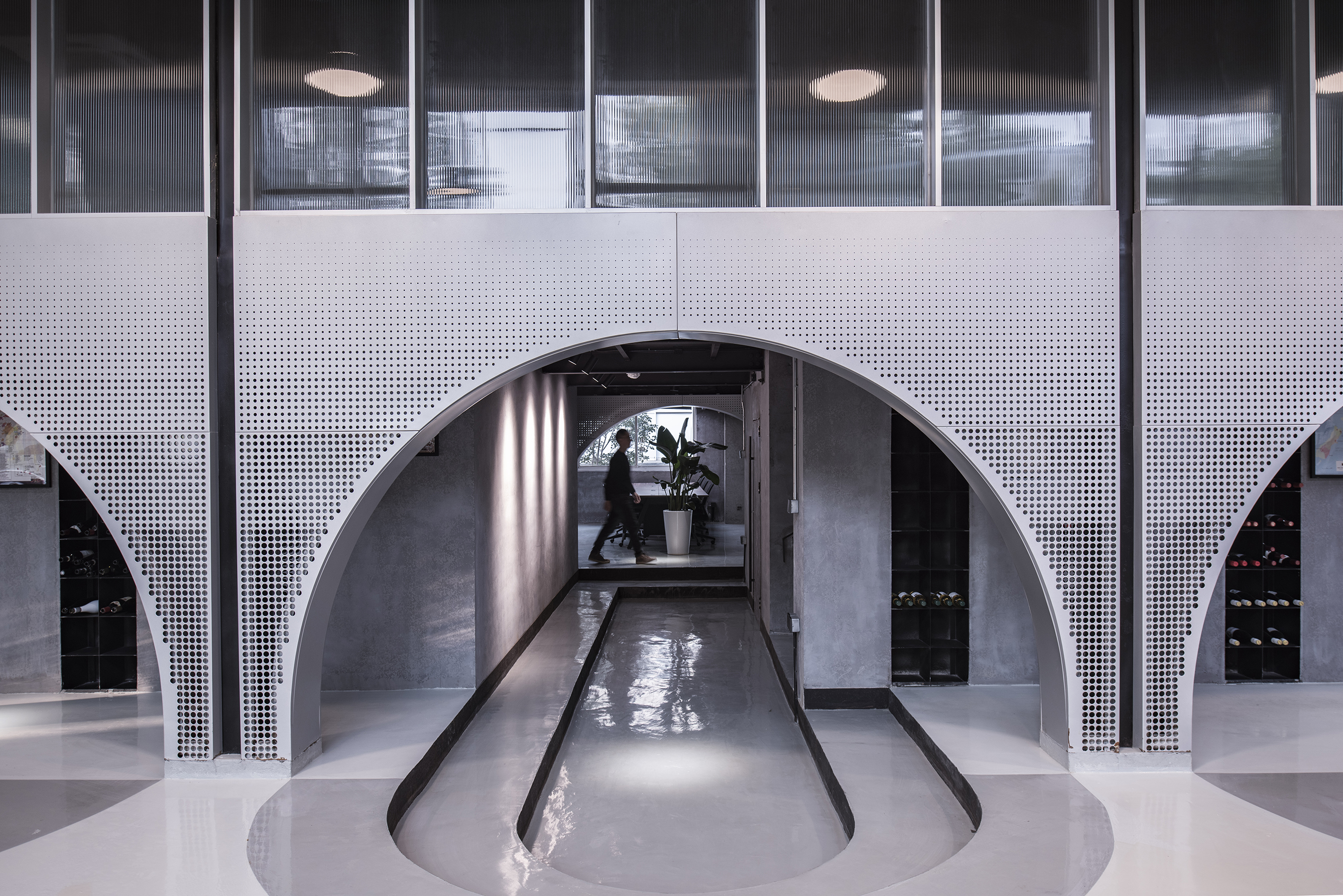
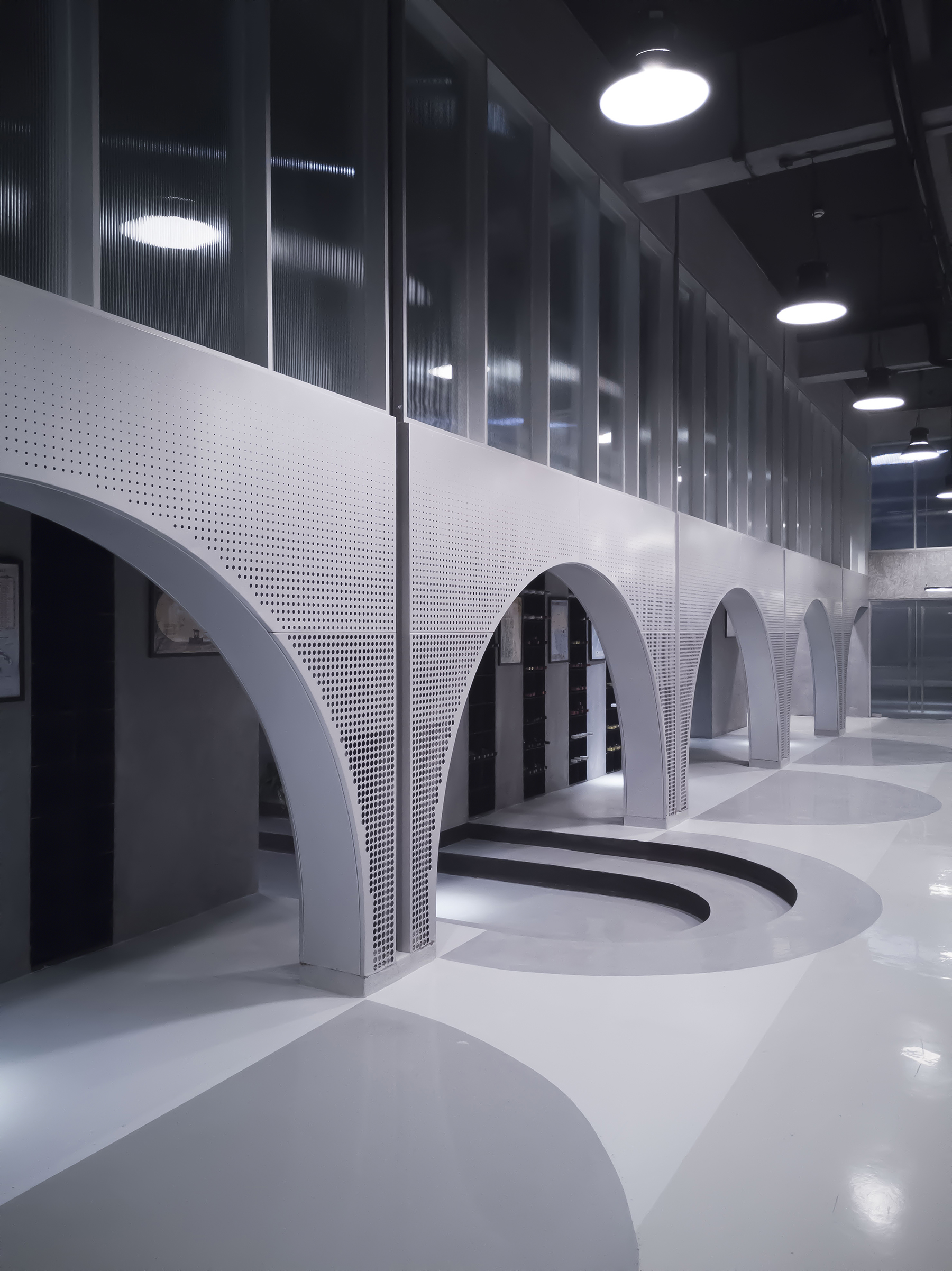
设计单位 MONOARCHI度向建筑
项目地点 中国上海
建成时间 2020年4月
建筑面积 1350平方米
本文文字由设计单位提供。
项目现场是长宽高为53.5×18.1×5.5米的高敞厂房空间。基于机械化生产的工业尺度的巨大压迫,第一次进入厂房的我们瞬间意识到“我”作为一个人时的尺度而存在,这种尺度上的极大反差,也令我们明确了空间的设计方向:从工业生产尺度到日常生活尺度(氛围)上的转变。
This site is a spacious factory which has dimensions of 53.5 meters long, 18.1 meters wide and 5.5 meters high. The huge oppression of the industrial scale of mechanized production, as we entered the factory for the first time, made us instantly aware of the great contrast between the space and the people. Transforming the industrial life into daily life has been the goal of our design.
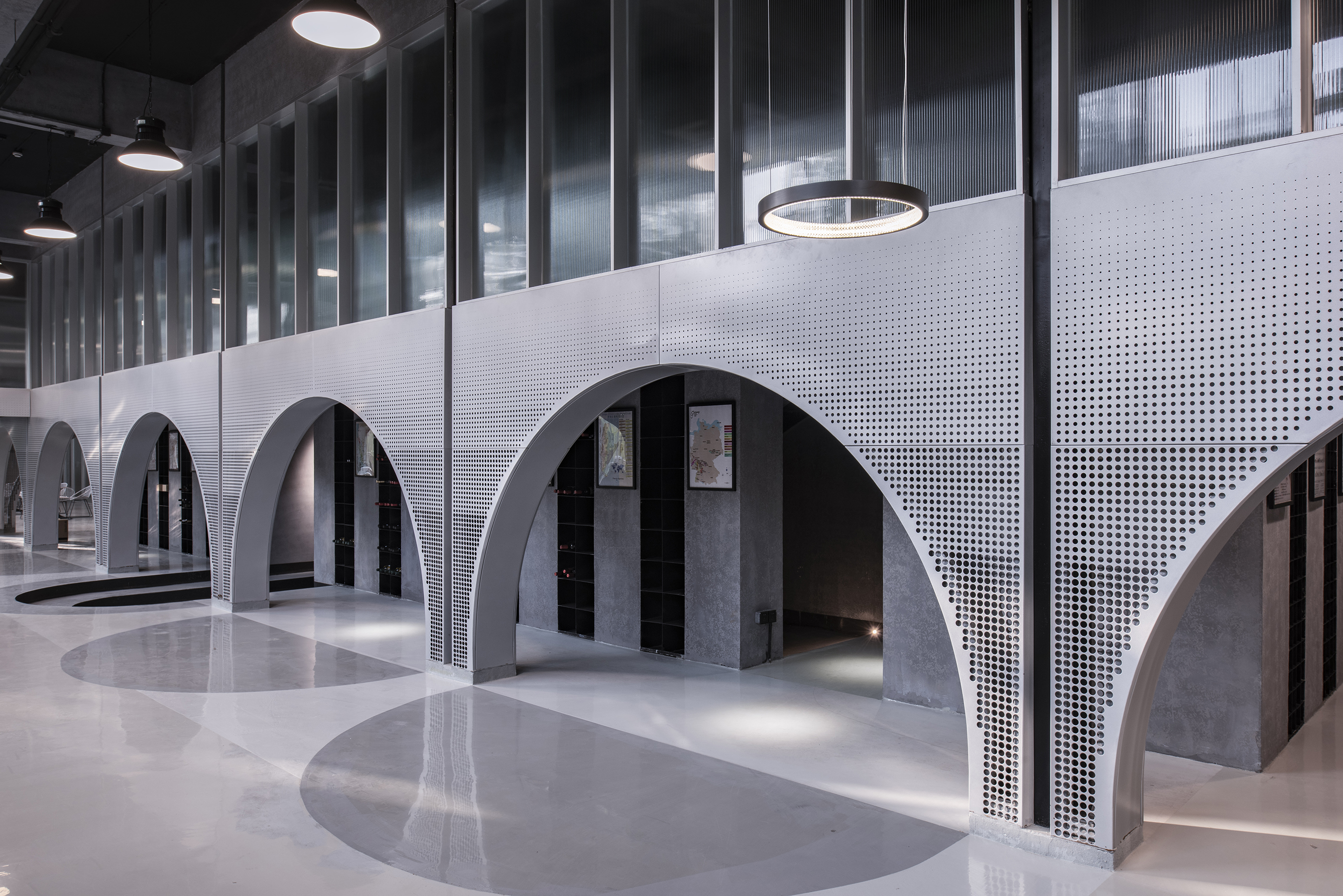

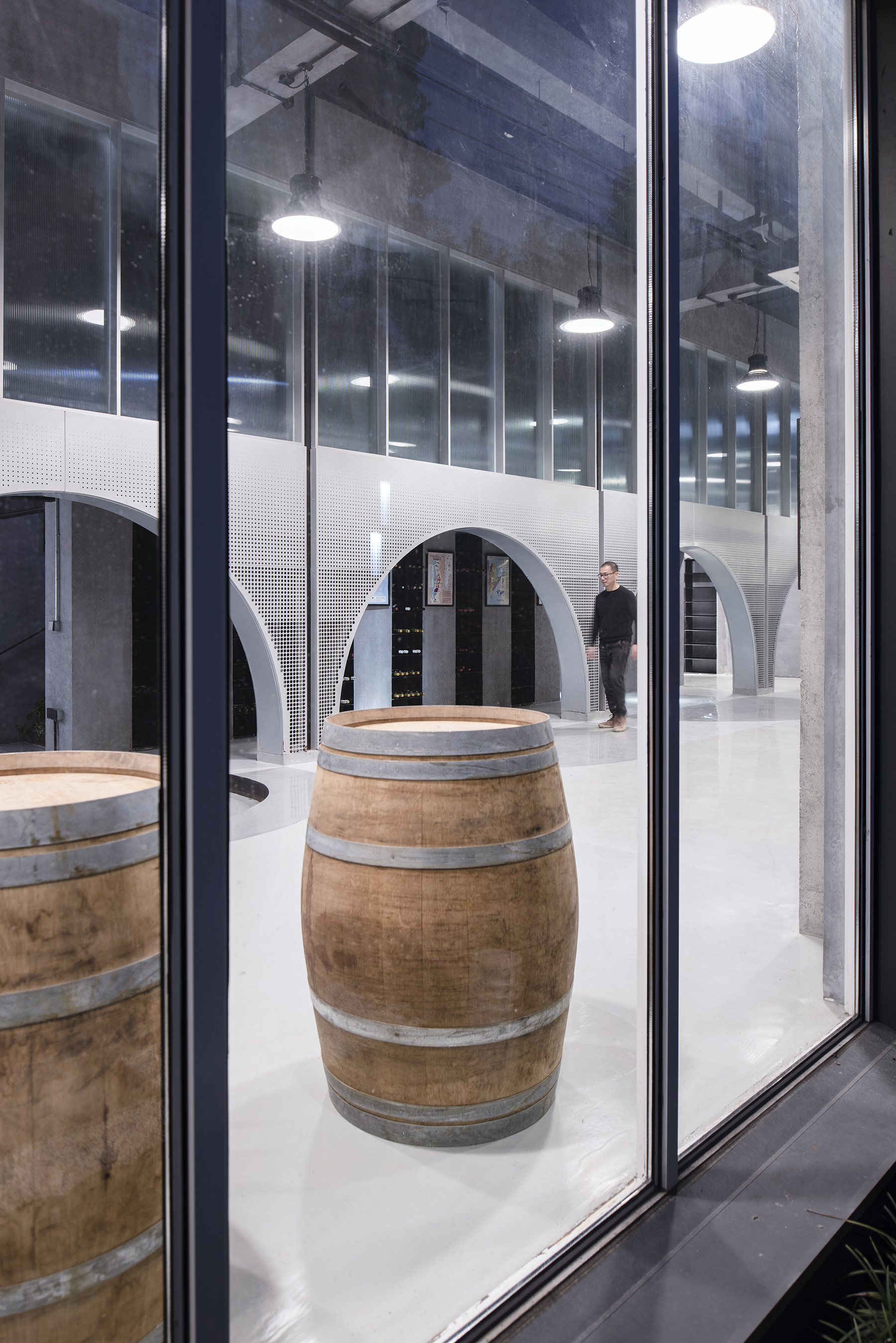
业主是一个以葡萄酒及相关农业产品的生产销售及展览推广的服务型公司,本项目需要满足业主的办公、展示、宴客、咖啡吧及酒品饮料等产品的储藏功能。厂房则为长方形平面,框架结构,单元柱网尺寸为9米×6米,主体空间层高为5.5米,东西两端各有一个双层空间,层高为3米。本次设计范围为东侧7×2跨的柱网空间。
The owner is a service-oriented company engaged in the production, sales , exhibition and cultural promotion of wine and related agricultural products. To meet the needs of office, display, banquet, coffee bar and storage of wine and beverage are required. The factory is rectangular and frame structured with column grids sized by 9m by 6m. The main space is 5.5 meters high and there is a two-storey space both at the east and west ends with a floor height of 3m. The design focuses on the space enclosed by 7x2 columns on the east side.


为了完成尺度上的转变,我们首先插入一个23×8.4×5.5米的长方形盒子A,把厂房在通高空间区域从南到北分割为4.8米+8.4米+4.8米的三段,完成空间的第一步界定和分割,把一个完整、简单、巨大的均质工业空间复杂化,编织出第一层密度;
We insert a rectangular box with dimensions of 23m, 8.4 m and5.5m, as we call it Box A, to divide the high space of this building from south to north into three sections, and each section is 4.8 meters long, thus making the complete, simple, huge and well-proportioned industrial space more complicated. This is the first spatial density.
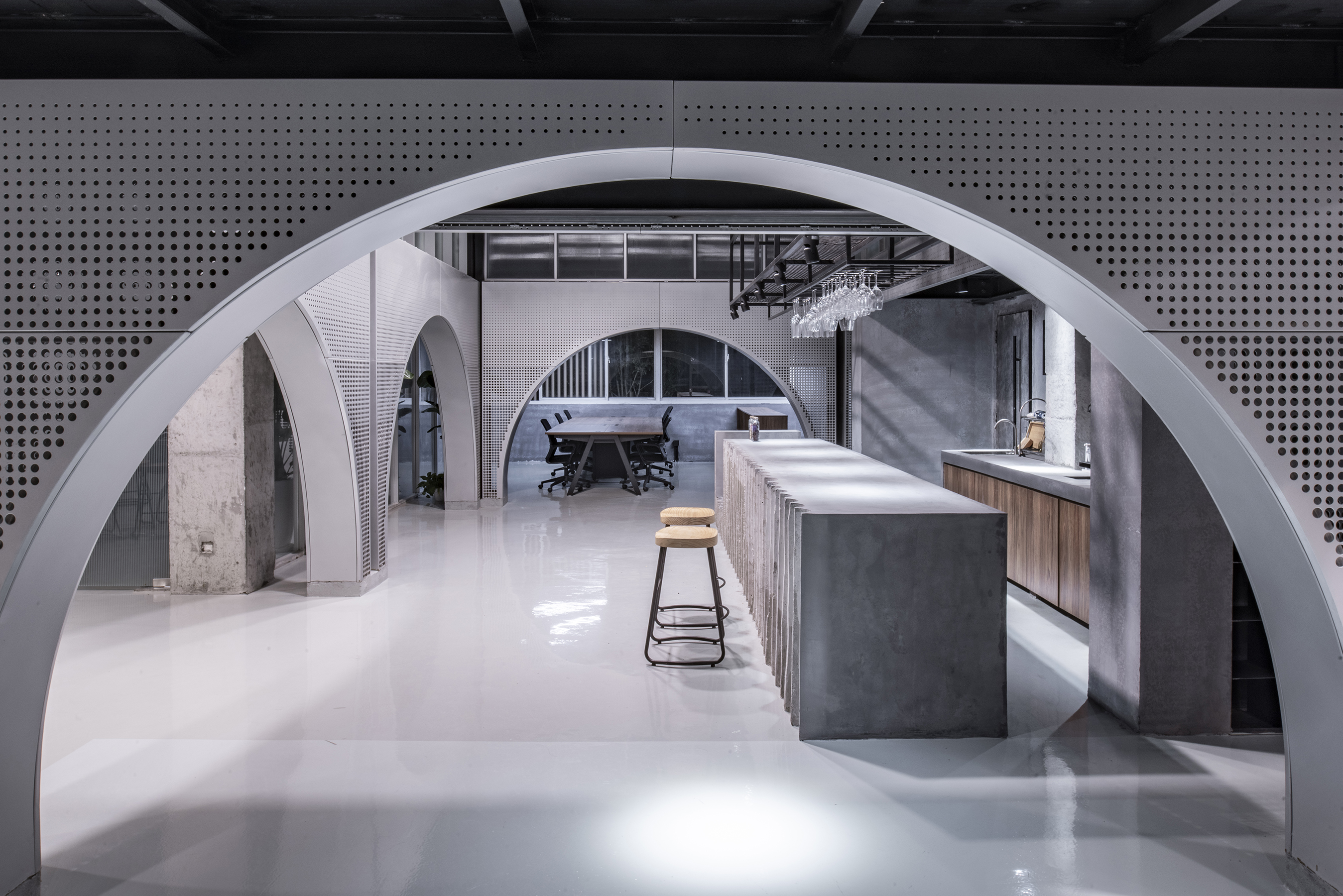


然后我们在这个长方形盒子的内部继续压缩,制造出一个16.5×5.6×2.2米的盒子B,在盒子A与盒子B之间就形成了一个宽度为1.4米的圈廊,由此产生了小型的近人尺度,为空间编织出第二层密度。
We continue to split the space inside Box A to create another box of 16.5m, 5.6m and 2.2m which we call it Box B. Thus a 1.4m-wide corridor between Box A and Box B is formed to give an intimate scale.
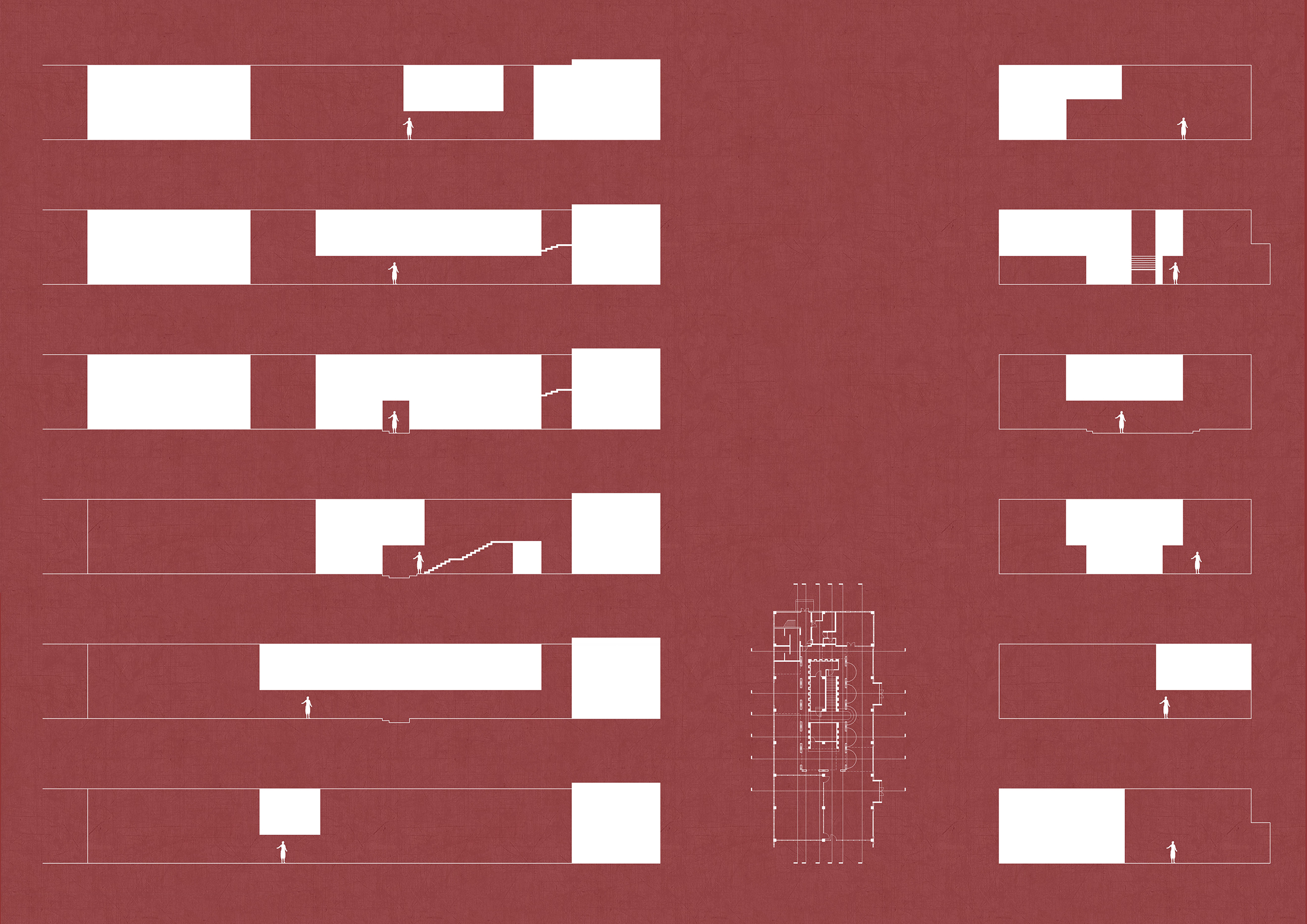

空间的第三层密度,是通过夹层空间的覆盖及延展来实现的,夹层在西向的端部和中段各自向南面和北面延展出两个盒子(C/D),它们的覆盖形成了空间的进一步区隔与尺度变化,在水平向和垂直向形成了大空间的再次切割。
The third spatial density is achieved through the coverage and extension of the loft space. The loft stretches two boxes (Box C& Box D) to the south and north respectively at the west end and the middle section, resulting in further changes in division and scale. The large space is divided again in the horizontal and vertical directions.

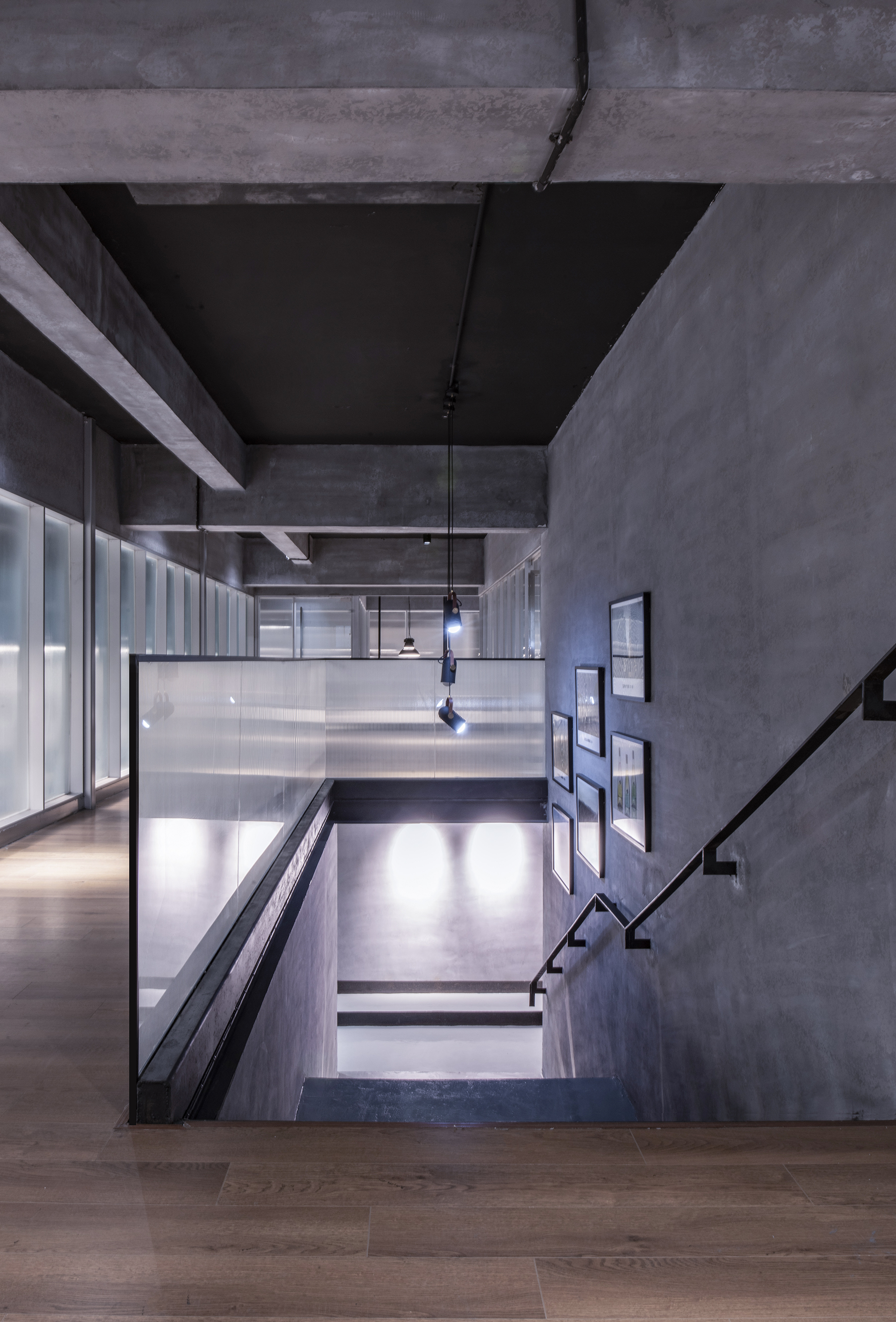
通过以上三个层次的空间密度提升,我们完成了一个大尺度工业场所向小尺度生活空间的建筑学重建。
By increasing the spatial density of the above three levels, we have completed the architectural reconstruction of a large-scale industrial site to a small-scale living space.
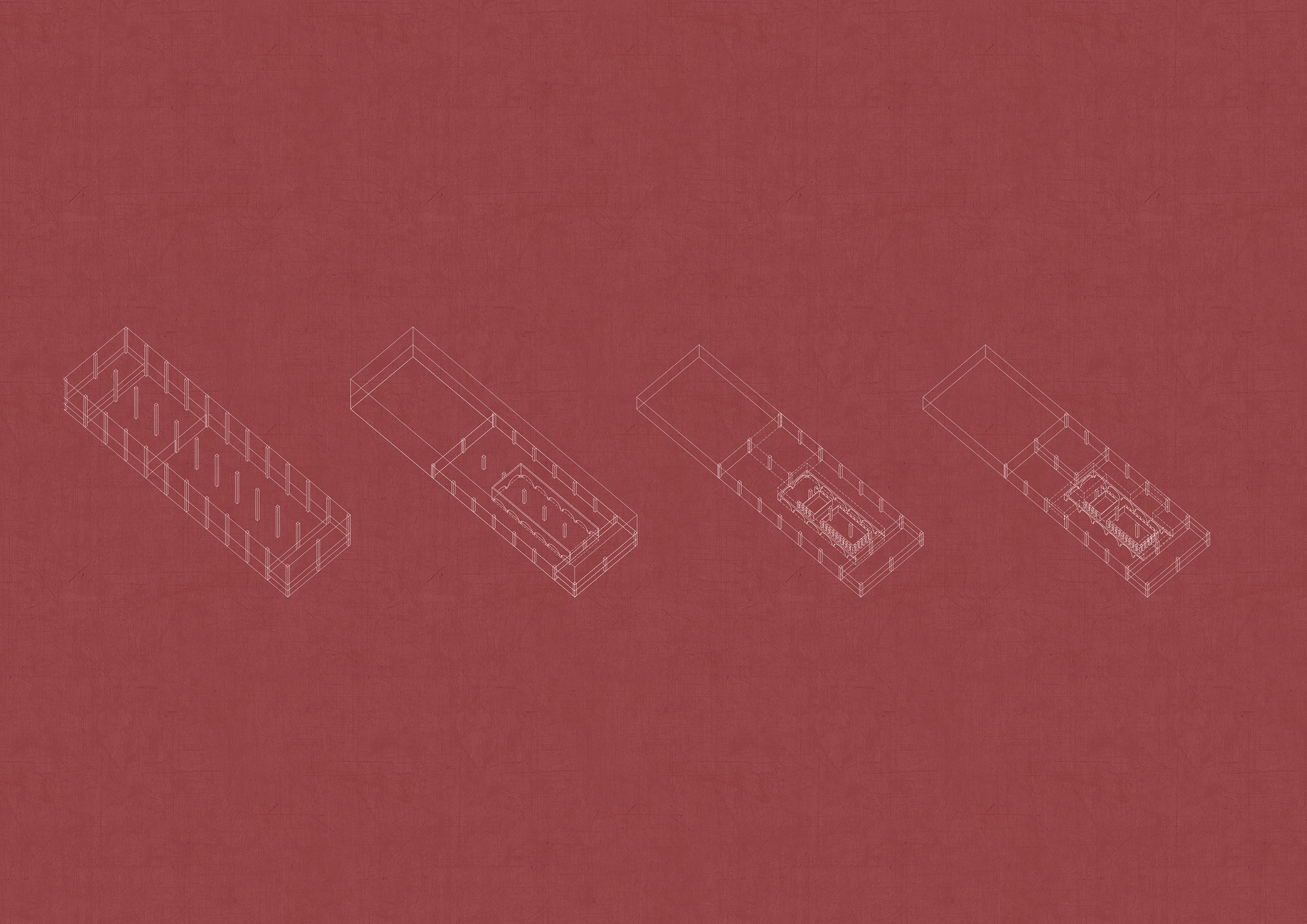
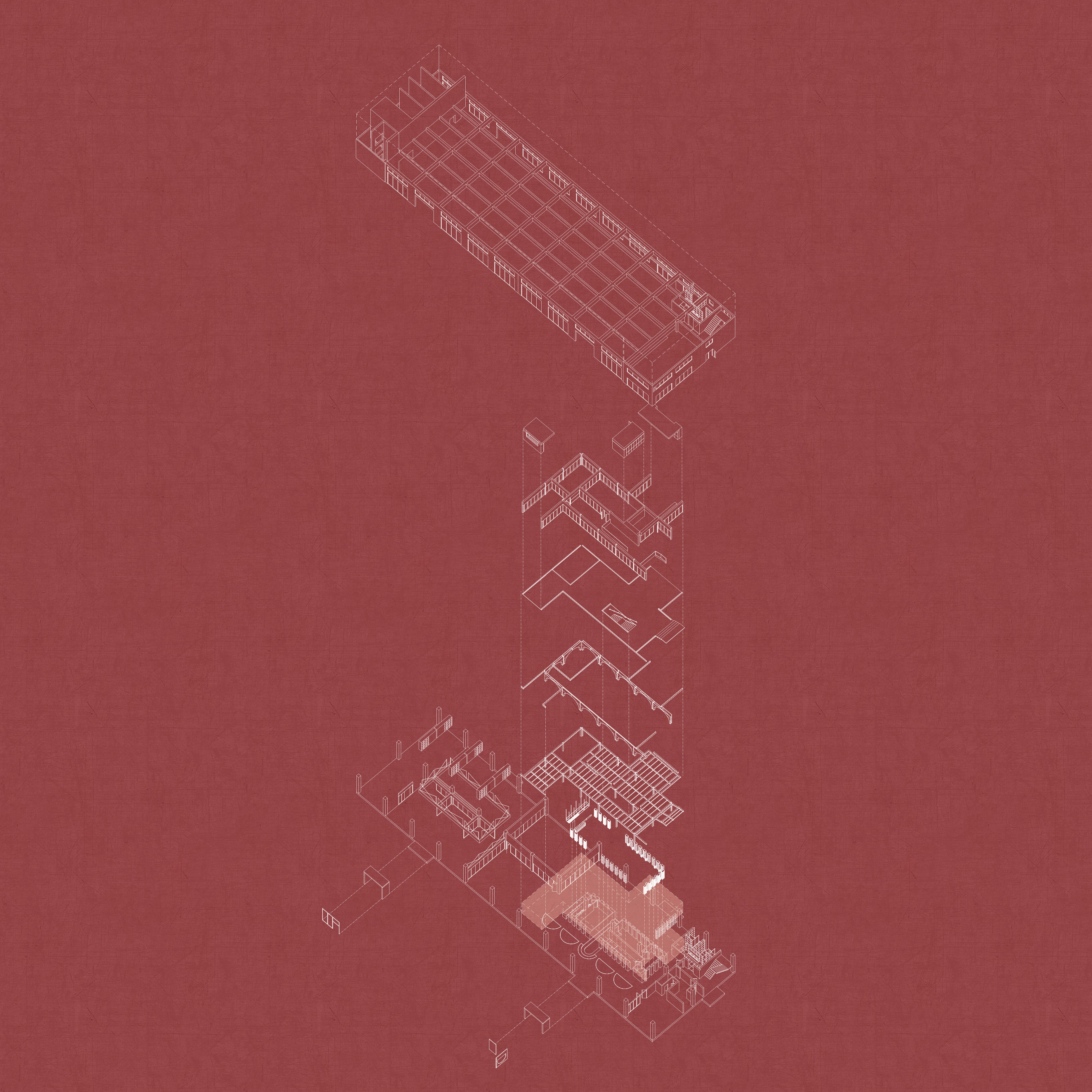
由于这个项目有着特殊的葡萄酒文化传播诉求,所以我们希望这个场所也能用建筑学的方式去表达出更深层次的文化阅读性。通过考察葡萄酒的发展历史,我们发现它实际上起源于亚洲的古波斯,后来经希腊逐渐扩散到欧洲大陆其余国家,继而风行于整个西方世界,成为西方文明的一部分。
Furthermore, we also hope that the culture in a deeper level that this place carries can be expressed through architecture as it has a special appeal for the spread of wine culture. By investigating the development history of wine, we found that it actually originated in ancient Persia in Asia, then gradually spread to the rest of the European continent via Greece, and then became popular throughout the Western world and became a part of Western civilization.
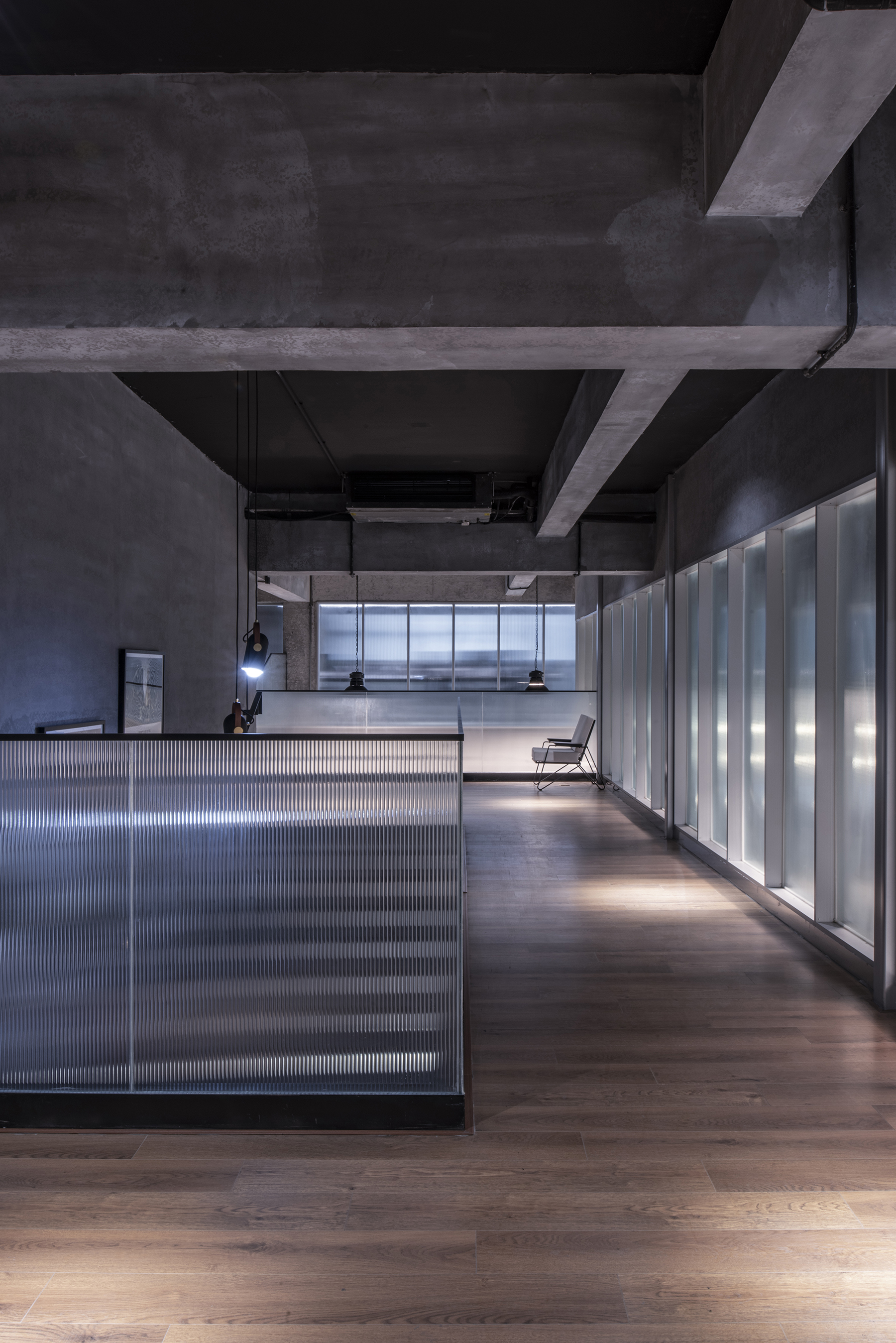

我们想象着是否可以用希腊文明的某个经典符号来传递葡萄酒文化的空间意向?而这方面的最高代表无疑是矗立于卫城之巅的帕提农神庙。我们在盒子A与盒子B的布局和形态两方面参考了帕提农神庙的内外双套柱列,辅以由此形成的回廊和多种尺度的空间套叠特征,形成了具有文化渊源的设计呈现。
We imagine whether we can use a certain classic symbol of Greek civilization to convey the spatial intention of wine culture? Undoubtedly, the highest representative in this respect is the Parthenon Temple on top of the Acropolis. For the layout and form of Box A and Box B, we refer to the inner and outer double columns in the Parthenon where cloister and the overlapping spaces of multiple scales are created, to present cultural origins in our design.
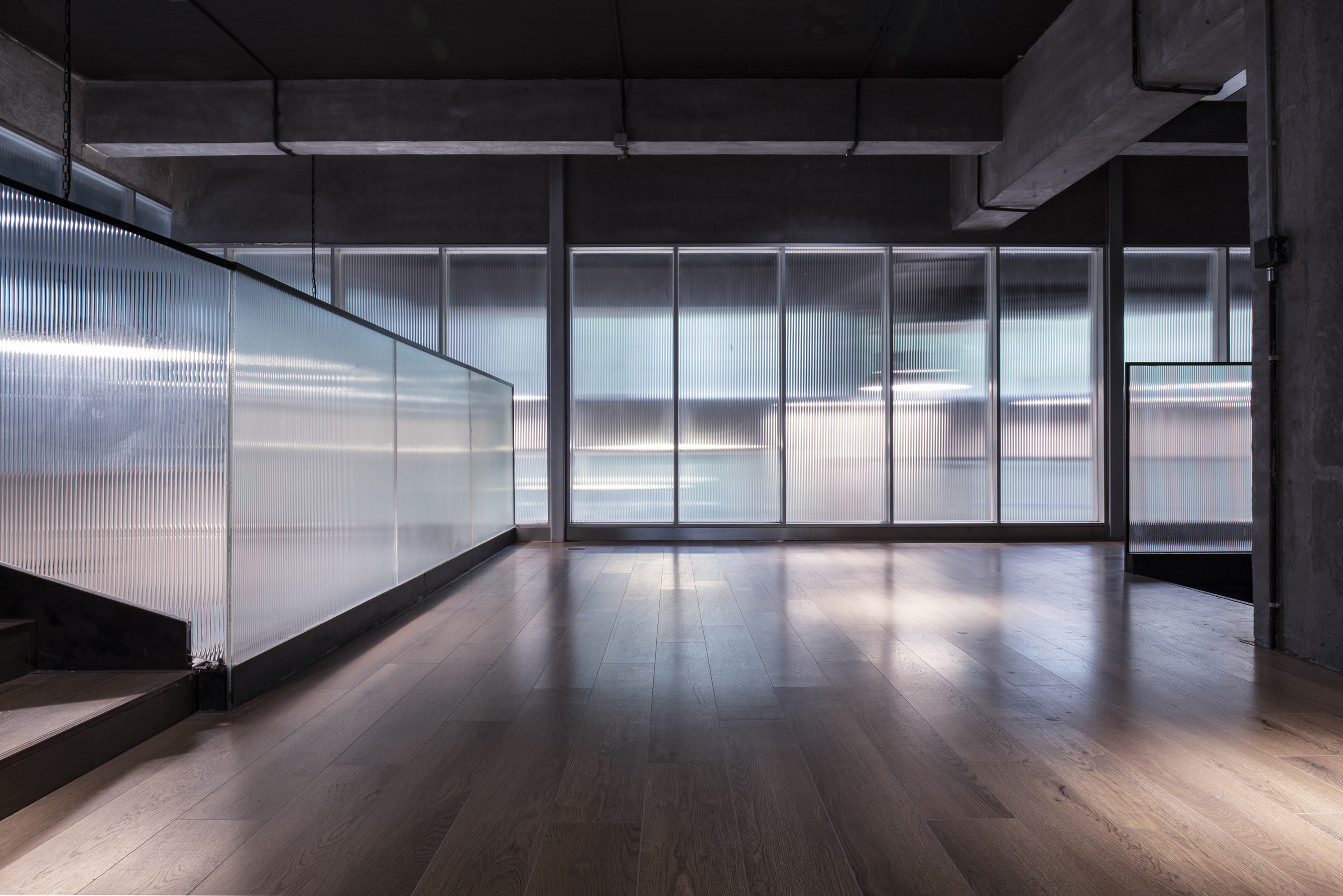
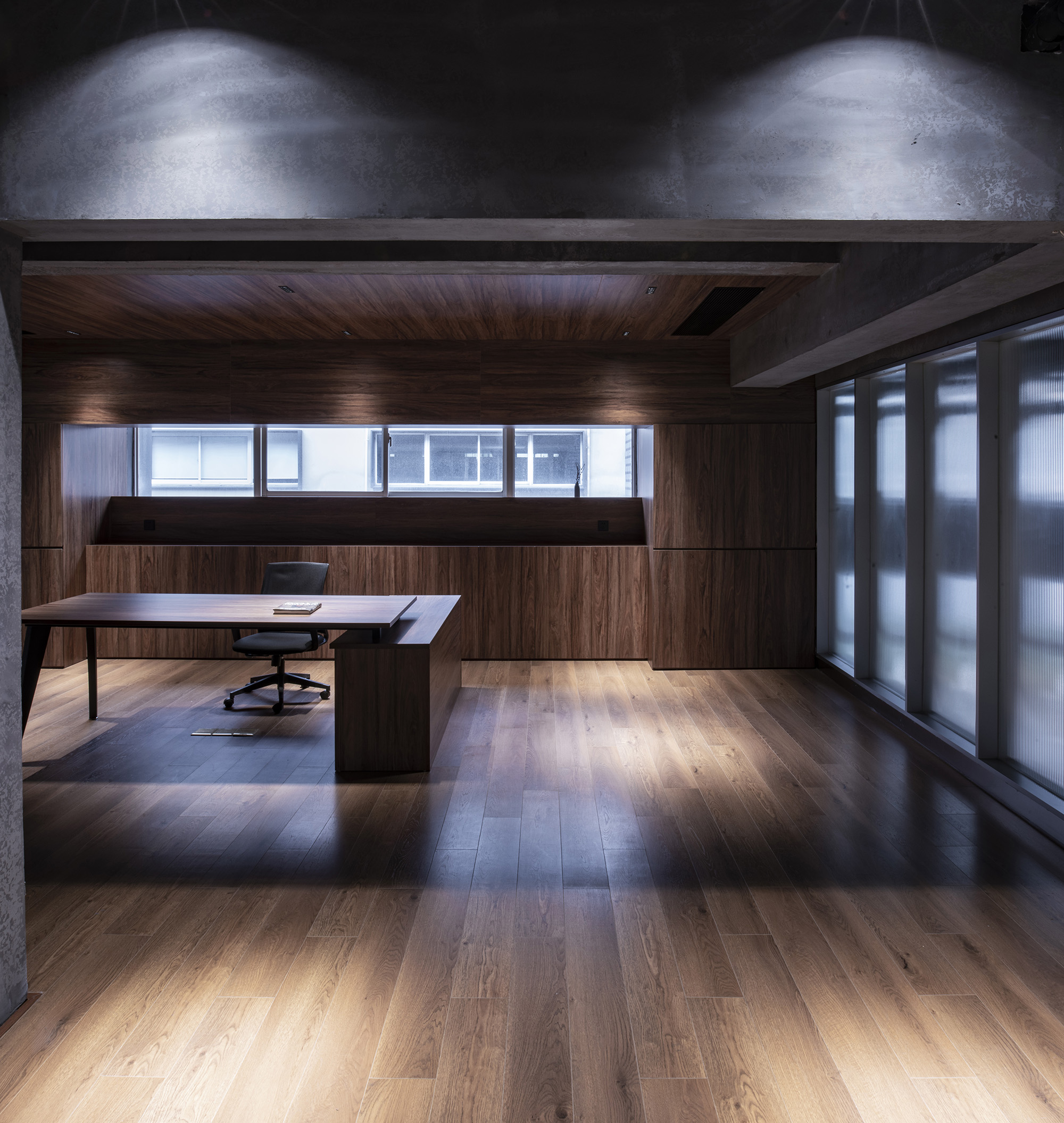

在功能设置上,盒子B这个核心空间实际上被用作酒品的储藏空间,而内层列柱演化成墙体和酒插重合,绕行一周成为了主要的葡萄酒文化展示空间。外围列柱没有做成经典的柱式,而是被设计成连续的拱,可以说是对传统葡萄酒酒窖采用的低矮拱顶的一种符号性引用。
In terms of function settings, the core space of Box B is actually used as a storage space for wine. The inner columns are combined by a circle of walls with in-built wine racks, which become the main showcases for wine culture. Instead of classic columns, the outer columns are made into continuous arches, which can be regarded as a symbolic reference to the low arches used in traditional wine cellars.

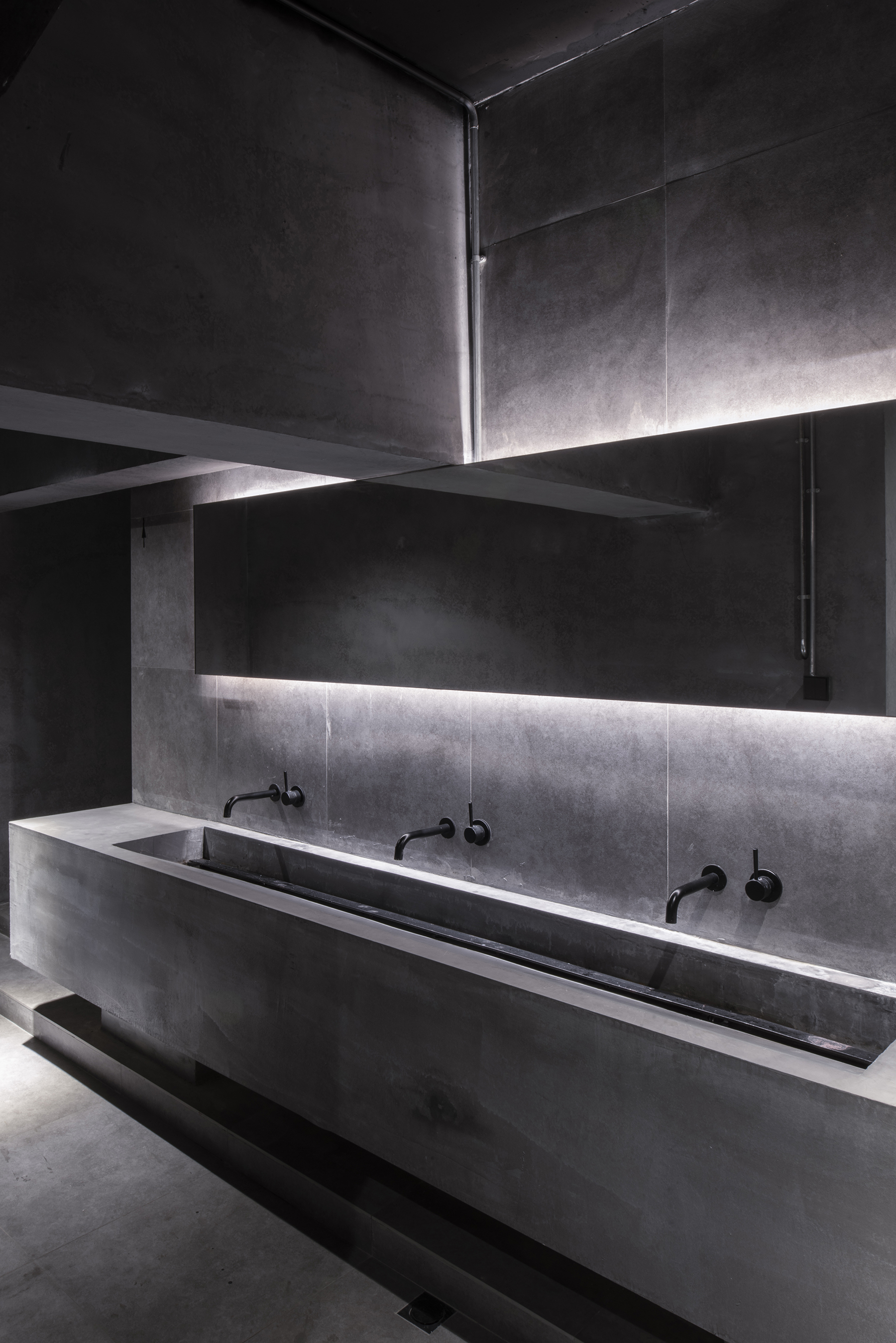
葡萄酒是属于原生态的一种食品,鉴于此,我们在空间表情的选择上也倾向于表达材料的真实属性,因此我们把原厂房的墙面和柱子粉刷层全部剥除,袒露出粗糙的混凝土,结合裸露的钢结构,形成真实的材料表达。空间的分隔材料选用了具有竖向凹纹的长虹玻璃,其半透明特质带来了空间的渗透质感,保证了培训、办公、会议、宴会及接待等各功能空间之间的私密性,其柔和的透光性也软化了整体冷峻硬朗的氛围。
Wine is a kind of in the raw food. In view of this point, we tend to express the space in a natural way. Skin layers of all the original walls and pillars are stripped off to expose the rough concrete, combining with exposed steel structure to present a real material expression. We select Changhong Glass, configurated glass with vertical concave pattern, for partition wall. This translucent feature brings a sense of penetration of the space, ensuring the privacy between the various functional spaces such as training, office, meeting, banquet and reception, and its soft light transmittance also softens the atmosphere that was cold and tough.
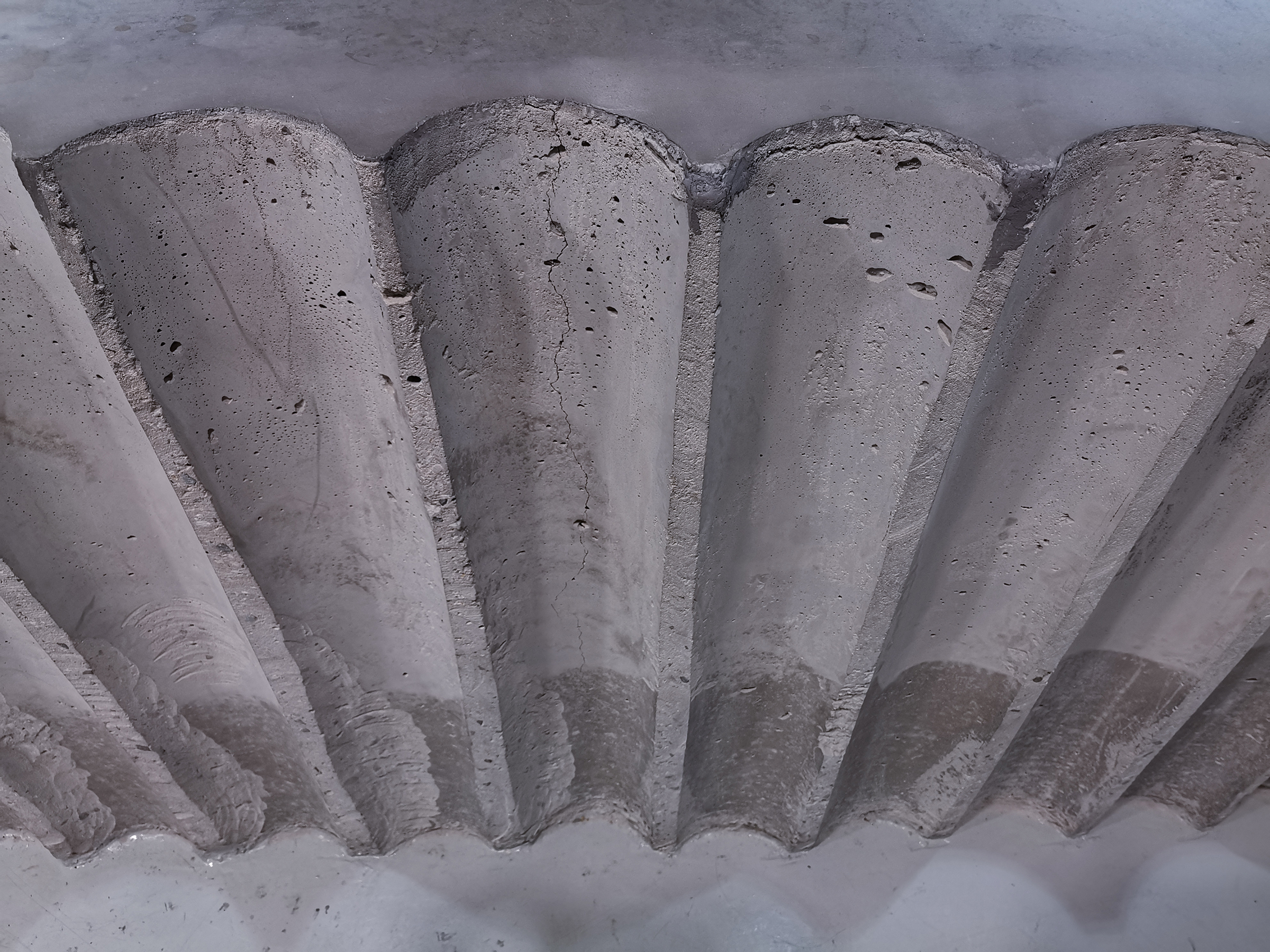
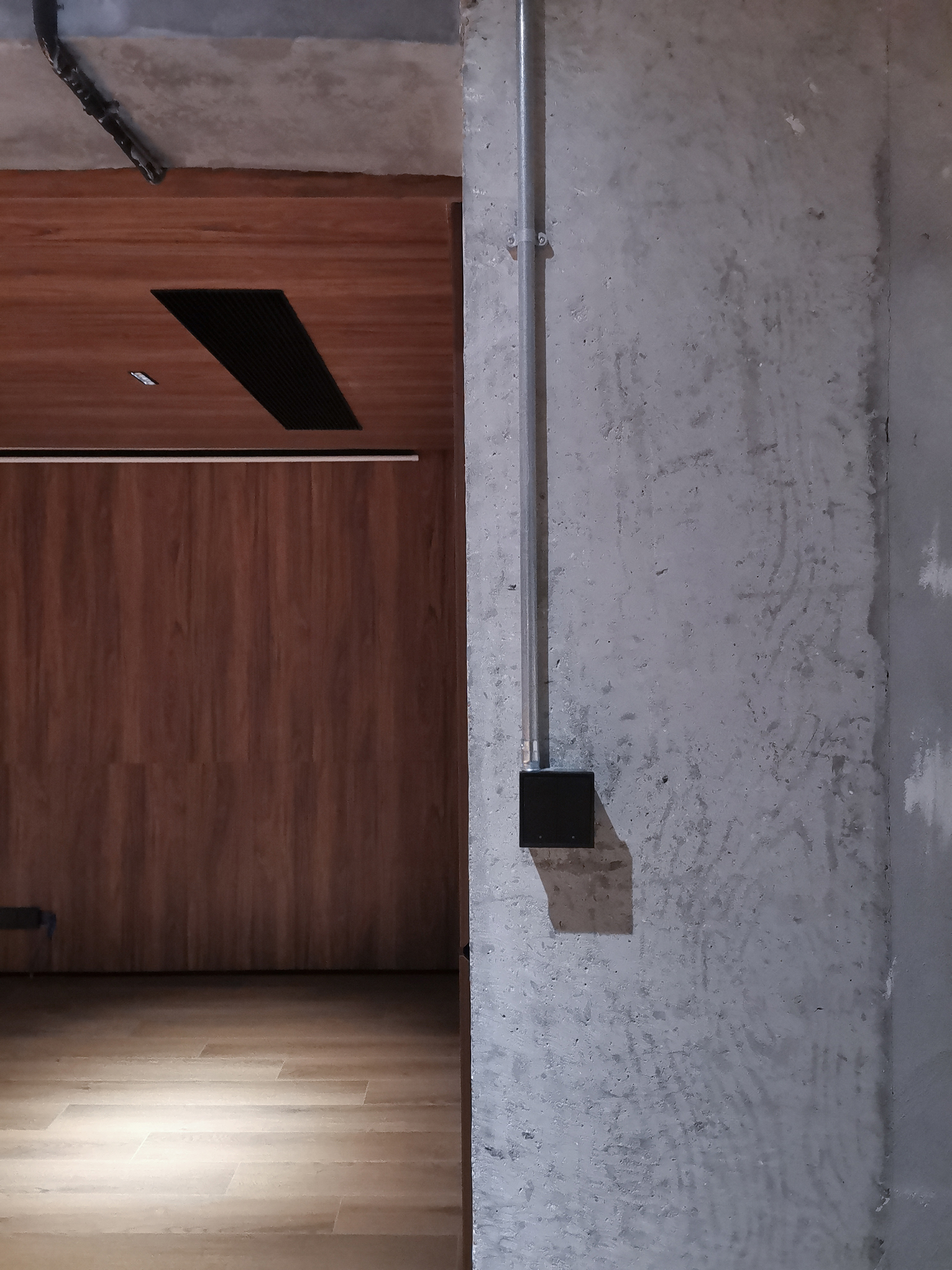
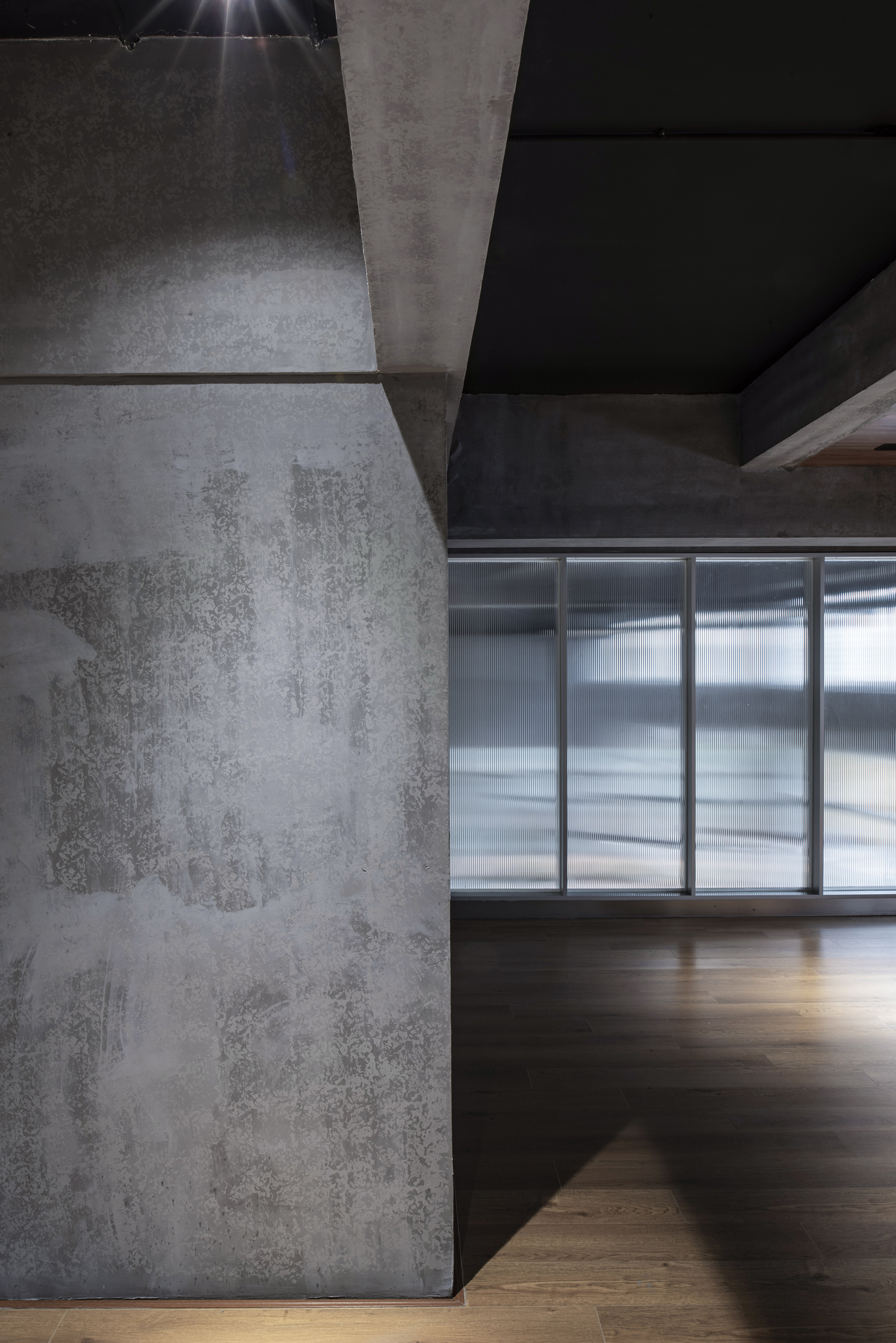
设计图纸 ▽
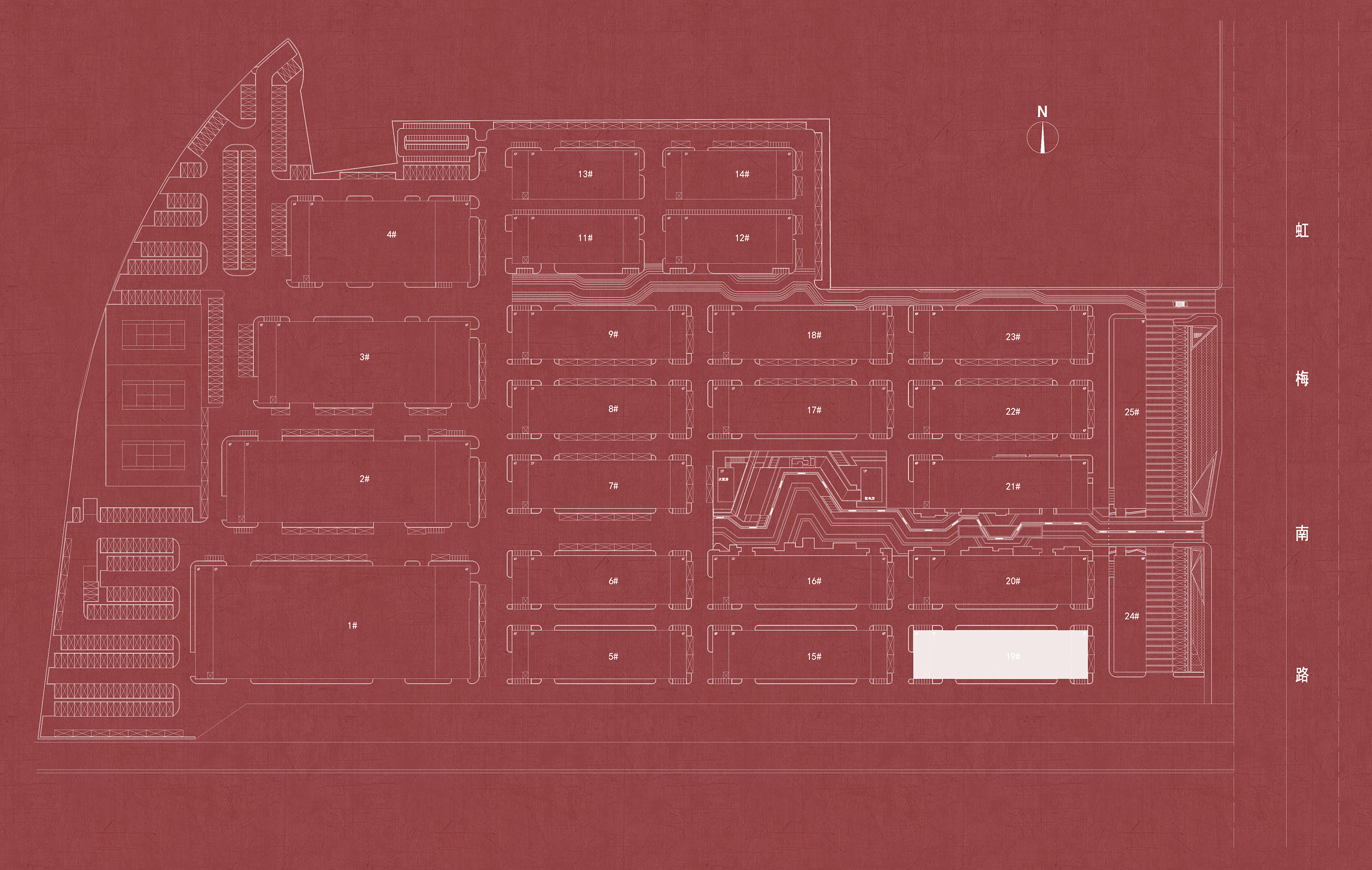
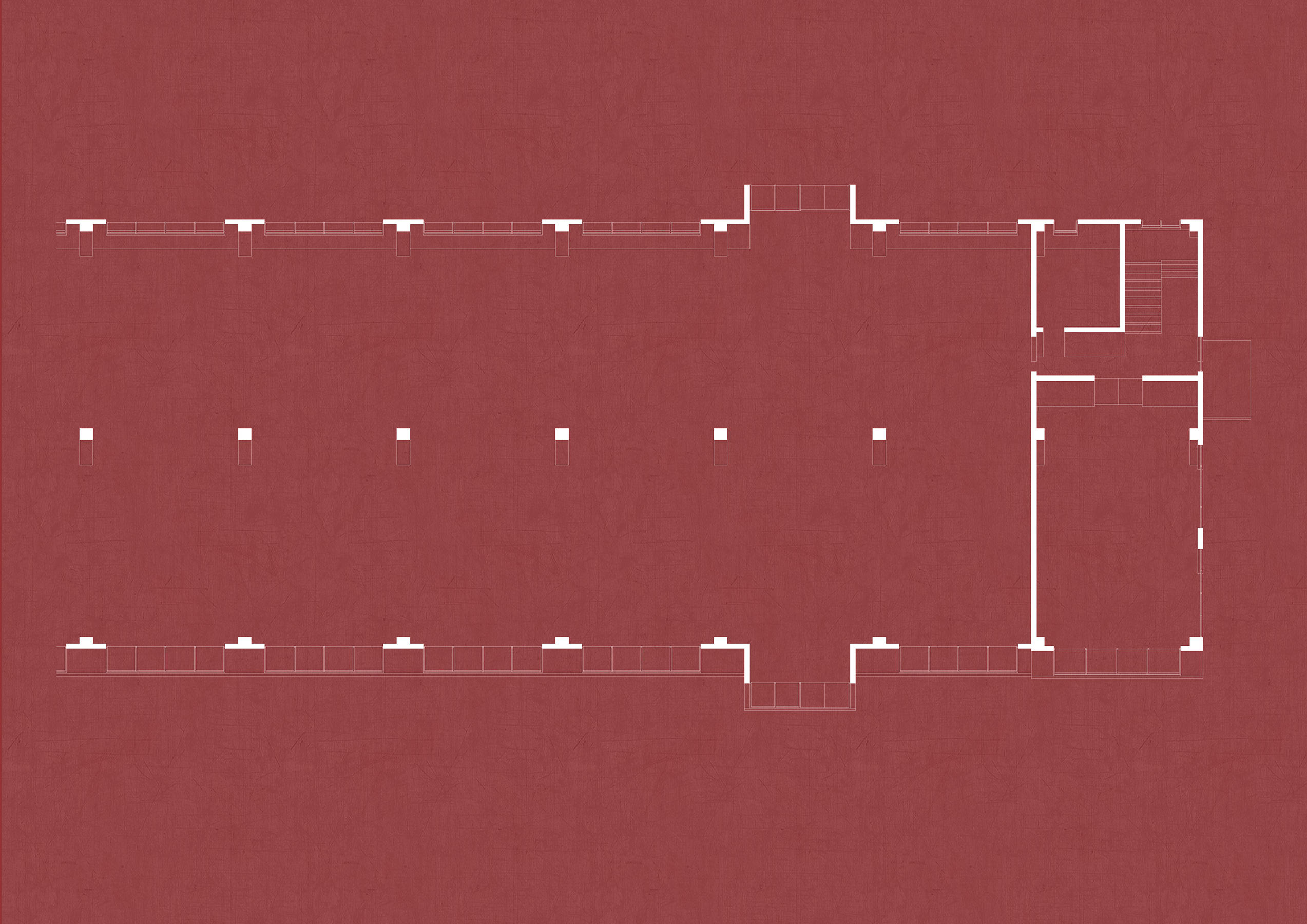
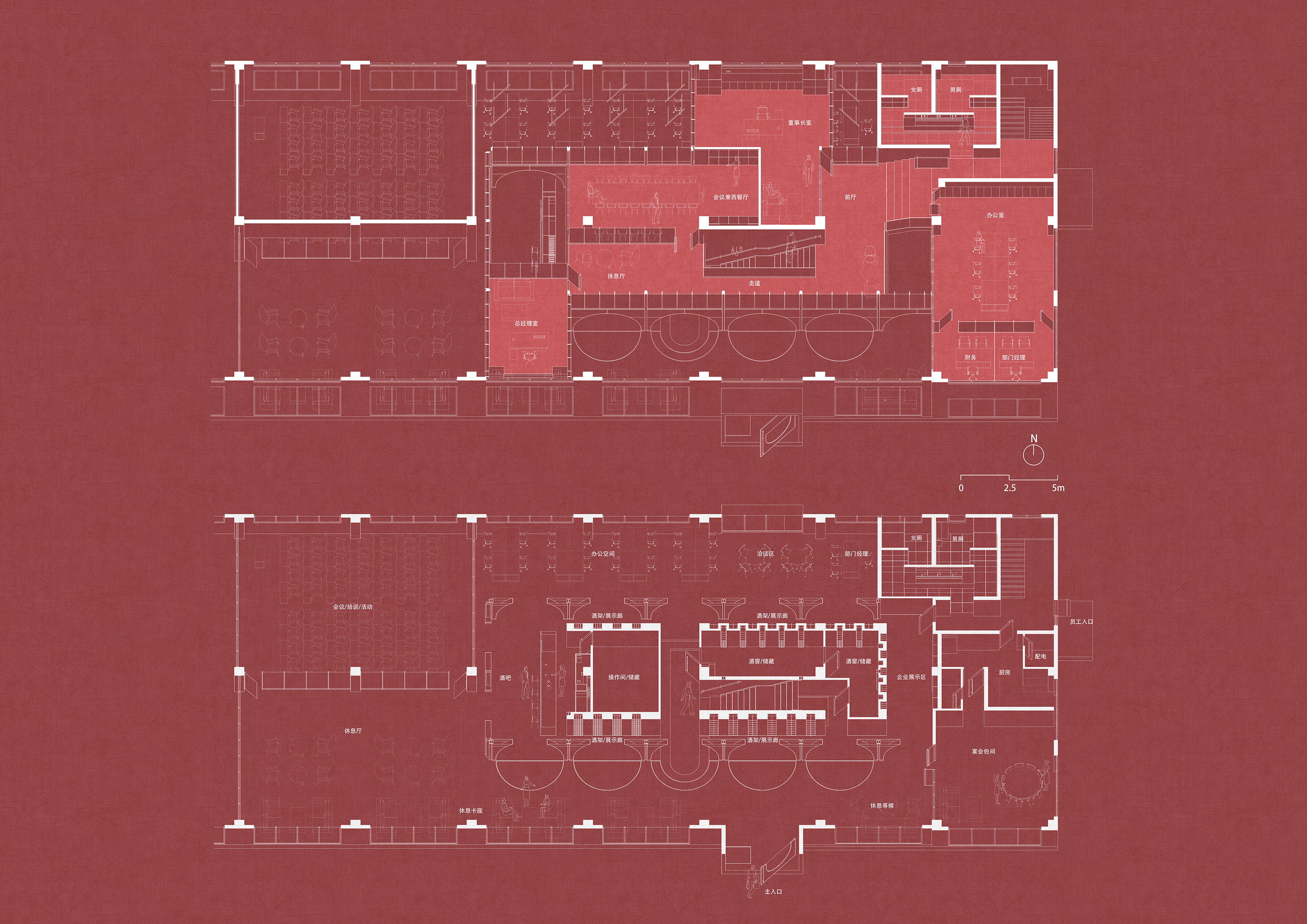

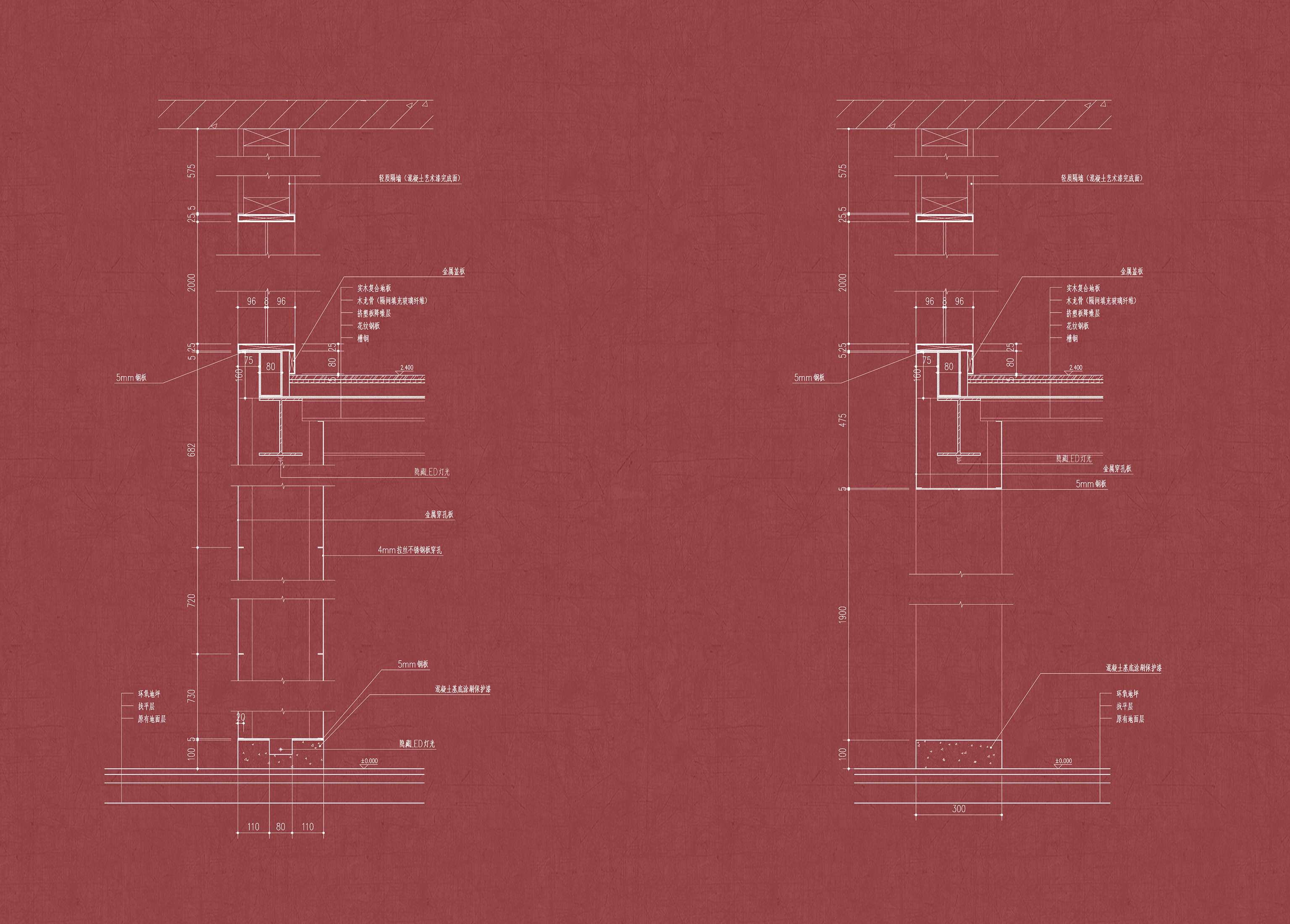
完整项目信息
项目名称:燎申智城19号楼改造
项目类型:工业建筑改造
项目地点:上海市虹梅南路4999号
建筑与室内设计:MONOARCHI度向建筑
主创建筑师:宋小超、王克明
设计团队完整名单:刘纪康、周沁怡
业主:上海江葡农业科技有限责任公司
造价:230万
设计时间:2019年8月—2019年12月
建设时间:2019年11月—2020年4月
用地面积:790平方米
建筑面积:1350平方米
照明:上海心烛照明工程有限公司
主体工程施工:宿迁九杰机械设备安装有限公司
玻璃幕墙施工:上海耀鹏玻璃制品有限公司
金属幕墙施工:一甲装饰设计工程(上海)有限公司
摄影:宋肖澹、酒父
版权声明:本文由MONOARCHI度向建筑授权发布。欢迎转发,禁止以有方编辑版本转载。
投稿邮箱:media@archiposition.com
上一篇:广州南沙建滔广场:堆叠攀升 / Aedas
下一篇:北京大院公寓T101:“老破小”现代化改造 / 诺亿设计研发